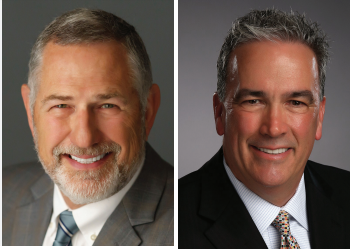Drs. Joel C. Small and Edwin McDonald say that a growth mindset embraces change, flexibility, and an ability to change with the times.

Drs. Joel C. Small and Edwin McDonald discuss the beliefs behind a growth mindset
Theories of leadership and organizational culture have undergone significant change in the modern era. During the industrial revolution, leadership was more of the “command-and-control” variety and “laborers” (a popular term at the time) were mostly performing mindless and repetitive tasks. Due to the nature of the work and the leaders’ mindset, laborers had no expectation or opportunity for growth other than to increase their capacity to produce more products.
Entering the modern era, we evolved from the Industrial Revolution to the information technology era which emphasizes mental capabilities and capacity. A command-and-control style of leadership is no longer effective. In fact, this leadership style has become counterproductive. Today’s best leaders now embrace a style of leadership that supports team building, individual creativity, and inclusiveness. Fundamental to this new leadership style is a different way of thinking known as a “growth mindset” — the belief that everyone on the team has the capacity for growth. This contrasts with a “fixed mindset” that believes basic qualities, like intelligence and talent, are fixed and unchangeable. Based on these contrasting mindsets, the resulting practice culture, which the leader creates, will reflect these underlying beliefs. Practice cultures based on a prevailing fixed mindset tend to become stagnant and decline over time, whereas growth-oriented cultures are able to scale individual and team capabilities and capacity to meet changing demands and future complexity.
We have identified three basic beliefs that are essential to the development of a growth mindset.
Growth is an organizational imperative
This recognizes that both individual and team growth are fundamental to our practice survival. Imagine that you practiced dentistry with a fixed skill set; that your skills were fixed and never improved from your graduation from dental school. As years passed, your ability to meet modern standards would continue to diminish until you and your practice eventually became irrelevant, marginalized, and failed. Unfortunately, this scenario plays out in many practices. The onset and progression of decline is often slow and imperceivable until a developmental (growth) gap becomes so broad that recovery is extremely difficult.
Failure leads to success
Remember how you learned to ride a bike? Initially you may have fallen and experienced some minor bumps and bruises until finally, one day, off you went. A similar experience holds true for personal and professional growth. Failure will often precede success, and leaders must learn to accept failure as a necessary steppingstone for ultimate success and mastery. It is our job to support our team through these developmental experiences and make each failure a learning opportunity. We do this by creating a psychologically safe environment that prioritizes growth despite the failures inherent in the growth learning process. We must recognize that scaling our organizational capability and capacity to meet future demands is essential to our survival.
Perfection is a myth
At the risk of being considered heretical, I have spoken the unspeakable. Perfection is a myth, and the belief in perfectionism can even be destructive. If perfection is attainable, growth comes to a screeching halt because there is no growth beyond perfection. The reason that perfection is a myth is that what may be considered perfect today will likely be viewed as imperfect in the future. For example, when I graduated my endodontic residency, the ideal root canal had a large access and canals that were enlarged through aggressive cleaning and shaping procedures. Today, the ideal root canal has a small access and preserves critical tooth structure utilizing modern cleaning technology and shaping techniques. What was perfect then is considered imperfect now. Furthermore, we create unnecessary stress and frustration for ourselves and our team by doggedly adhering to a perfectionist mindset. It would be far better for everyone if we could alter our mindset to one that promoted constant improvement rather than unattainable perfection. Seeking constant improvement is more aligned with a growth mindset and more easily accepted by our staff.
Past research indicates that our expectations of our team will likely be reflected in the results they achieve. Believing in our team’s capacity for growth and expecting continuing improvement in their performance and skills will pay dividends for our practices if we create a work environment that is conducive to growth.
Strong, creative, and adaptive leaders have a growth mindset. Read more about “The Abundant Leader” here: https://endopracticeus.com/the-abundant-leader/
Stay Relevant With Endodontic Practice US
Join our email list for CE courses and webinars, articles and more..

 Drs. Joel C. Small and Edwin (Mac) McDonald have a total of over 75 years of dental practice experience. Both doctors are trained and certified Executive Leadership Coaches. They have joined forces to create Line of Sight Coaching, a business dedicated to helping their fellow dentists discover a better and more enjoyable way to create and lead a highly productive clinical dental practice. Through their work, clients experience a better work/life balance, find more joy in their work, and develop a strong practice culture and brand that positively impact their bottom line. To receive their free ebook, 7 Surprising Steps to Grow Your Practice Through Leadership, go to
Drs. Joel C. Small and Edwin (Mac) McDonald have a total of over 75 years of dental practice experience. Both doctors are trained and certified Executive Leadership Coaches. They have joined forces to create Line of Sight Coaching, a business dedicated to helping their fellow dentists discover a better and more enjoyable way to create and lead a highly productive clinical dental practice. Through their work, clients experience a better work/life balance, find more joy in their work, and develop a strong practice culture and brand that positively impact their bottom line. To receive their free ebook, 7 Surprising Steps to Grow Your Practice Through Leadership, go to 
